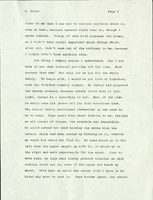Search the Special Collections and Archives Portal
Search Results

Chapter from autobiography by Bella Stern, 1980
Date
Archival Collection
Description
In this chapter, Stern describes her upbringing in Russia and fleeing to Poland. It is accompanied by a letter to the publishing company William Morrow.
Text

Interview with Marcell Eugene Bridges, June 12, 2004
Date
Archival Collection
Description
Text

Interview with Zenna Mae (Schmid) Bridges, June 12, 2004
Date
Archival Collection
Description
Text

Cindy Baca oral history interview: transcript
Date
Archival Collection
Description
Oral history interview with Cindy Baca conducted by Barbara Tabach on May 22, 2019 for the Remembering 1 October Oral History Project. Cindy Baca, born and raised in Las Vegas, talks about her family and occupation as a librarian at Escobedo Middle School. Cindy's twin daughters were present and injured during the Route 91 Festival and October 1 shooting. She describes their experiences and the Random Acts of Kindness project she piloted at her school after the incident.
Text

Transcript of interview with Velma Haselton by Catherine Bellver, September 13, 2001
Date
Archival Collection
Description
Interviewed by Catherine Bellver. Velma Haselton was born in St. Louis, Missouri, in 1914. She worked as an assistant bookkeeper for Hart, Schaffner and Marx and rose to Assistant Credit Manager. Velma worked at various jobs after she married for the second time and her son was born. She also represented the San Francisco CPA firm Lybrand, Ross Brothers and Montgomery (now Coopers Lybrand) in various capacities, both in California and St. Louis, eventually attaining the position of controller. Velma moved to Las Vegas for the first time in the 1950s, where she and her husband Don ran a coffee shop at the Park Lane Motel on South Fifth Street. Family requirements necessitated a move back to California. In 1971, Velma and her third husband, Charles Haselton, "retired" to Las Vegas. Velma immediately went to work as a cost accountant for United Pipeline, and later as an accountant for Kafoury Armstrong, a CPA firm. She eventually ran her own accounting business. Velma also held memberships and offices in various women's service groups.
Text

John McKay interview, March 3, 1980: transcript
Date
Archival Collection
Description
On March 3, 1980, Donna Malloy interviewed John McKay (b. July 7th, 1926 in North Dakota) about his life in Las Vegas, Nevada. McKay begins by speaking about his family history, his career in the electronics and engineering field for aerospace, as well as his experiences in two wars. Moreover, McKay speaks about his hobbies of hunting and fishing and his time as a musician around Las Vegas. McKay also spends time going over how the city of Las Vegas has grown and changed, the increase in crime, and the extreme floods in the 1950s. Lastly, McKay talks about the Nuclear Test Site, how casino gaming chips were used as money around the city, how the city of Las Vegas started and the future of the valley.
Text

Transcript of interview with Mahamed Youssouf by Barbara Tabach, August 6, 2013 & August 13, 2013
Date
Archival Collection
Description
Ethiopian business owner Mahamed Youssouf became an American citizen in 1986. Born in Harar, Ethiopia, he recalls the hardships he had to endure during the Ethiopia-Somalia conflict. Coming from a family of tailors, he began making clothes with his father at a very early age. Mahamed’s recollections concerning his journey from political refugee to successful businessman demonstrates his resilience and determination to overcome obstacles and achieve his goals. Mahamed moved to Las Vegas, Nevada in 1985, where he rented a storefront in North Las Vegas. The name of his store was Uniform Plus and he focused mainly on making children’s clothes. His efforts proved lucrative as he began buying wholesale in Los Angeles, California, and selling clothes in Las Vegas on the weekends at the outdoor Swap Meet. After a fateful encounter, Mahamed became business partners with Eugene Hoffman, owner of Village East Cleaners. Mahamed firmly believes that communication is the key to socio-economic success. He views education as an investment and states that, “to have dialogue means better relationships.” When the Ethiopian government was overthrown, Mahamed returned home to Africa for a visit. He met his wife while there, got married, and started a family. Mahamed returned to America and bought a family home in Las Vegas. He dedicated his time to teaching his American born children more about Ethiopian culture and taught himself more about American culture— including the African-American experience in Las Vegas, racism, the Moulin Rouge, and the Westside.
Text

Transcript of interview with Sarah & Joni Fried by Barbara Tabach, March 4, 2016
Date
Archival Collection
Description
The website for Freed’s Bakery happily displays the headline: Baking Sweet Memories Since 1959. Today the third generation of Frieds (correct spelling of the family surname) is hard at work creating incredible wedding cakes, cookies, and delightful desserts for the Las Vegas valley. For this oral history interview, Joni Fried, her daughter Sarah Fried, and nephew Max Jacobson-Fried sit to share stories of working in the family business started by Joni’s parents Milton and Esther Fried. Joni has handed the reins over to the third generation who invest their delicious souls into maintaining this Las Vegas tradition. Their tales range from childhood memories of holidays baking and cleaning to their personal favorite desserts. They also explain the impact on their business as early adapters of computer technologies and social media marketing. In October 2017, Freed’s Bakery landed a TV show, Vegas Cakes, on the Food Network.
Text

Transcript of interview with Elinor Horden by Valerie Fujii, February 13, 1930
Date
Archival Collection
Description
On February 13th, 1980, collector Valerie Fujii interviewed dancer, Elinor Horden, (born May 21st, 1930 in Ohio) at the University of Nevada, Las Vegas. This interview covers local entertainment in the 1950s and the social and environmental changes that have occurred in Las Vegas, Nevada.
Text

